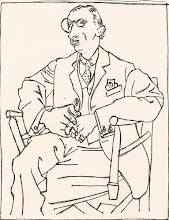

In director-writer Guillermo del Toro’s new film, Pan’s Labyrinth, Alice in Wonderland meets Spanish fascism. Pan is a fantastic film of pure directorial vision full of allegorical wonders and beautiful imagery. Del Toro creates a fantasy land of horror, enchantment, fear and innocence.
The main character Ofelia, played flawlessly by Ivana Baquero, enters a new world with her mother’s new husband, the horrific Captain Vidal—a loyalist to Francisco Franco’s fascist army in 1944 Spain. Ofelia loves books, especially the fairy tales that tell of mythical creatures. Upon her arrival to the mill, where the Captain is stationed, she discovers an ancient labyrinth that she is led to by an insect fairy. Upon a later trip to the labyrinth, she meets the faun, who also has an ancient appearance—a look as if he were a part of the trees and rocks where he dwells. This design element is a brilliant move by Guillermo del Toro, who did many drawings for the designs himself having much experience in make-up and special effects costuming. The faun tells Ofelia that she is the lost princess of the underworld and in order to regain her crown, she must complete three tasks before the full moon. Ofelia is faced with many difficulties in completing her tasks, including her mother’s painful, and ultimately fatal pregnancy, and the unrelenting cruelty of the Captain. In the end, she gives her own life to claim her crown—a sacrifice made when she is shot by the Captain. The fairy tale story is ultimately a tragedy, but one that retains great truth.
In an interview with Fresh Air’s Terry Gross, del Toro revealed how important fairy tales and monsters were in his childhood growing up in Mexico. He explained its prominence in his life as a sort of religion. He said that he believed in fairies and monsters as a child like some people believe in Jesus Christ as adults. Also, growing up in a strict Catholic household, tales of fantasy were shunned, so they offered del Toro an escape from the rigidity of Catholicism. Del Toro revealed that his grandmother attempted to exorcise him twice as a child, thinking his drawings of monsters were works of the devil. Along with del Toro’s obsession with fairy tales, he also explained to Terry Gross his passion for the history of the Spanish Civil War and the attempts of the resistance fighters to stop Franco’s regime. He continued to say that the resistance effort in Spain was largely ignored by the Allied Forces in the years after the Civil War because of the focus on Hitler in WWII. So, their story is a relatively untold one.
Through Ofelia’s story in Pan’s Labyrinth, del Toro shows how innocence is killed by war. Ofelia attempts to escape the horrors of the Captain and the war by retreating to her magical quest to become a princess in a better world. Her world is being torn apart by the evil Captain and the fascism that is plaguing Spain. In the end, her baby brother is saved by the resistance fighters, but what is lost through violence cannot be regained. At the end of the film, only traces of the Ofelia’s innocence and inquisitive spirit are left. In a world ravaged by war and despaired by fascism, true innocence is lost.
Rating: * * * *

